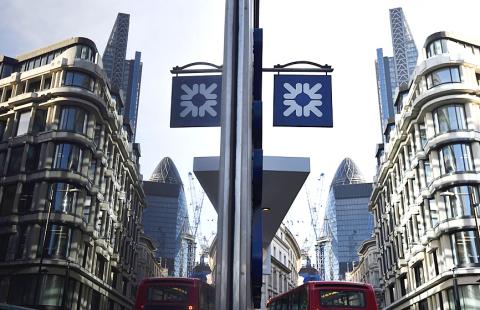Royal Bank of Scotland Group PLC (RBS) bolstered its capital plan after failing multiple hurdles in the Bank of England’s (BOE) toughest-ever stress test.
Some “capital inadequacies” were revealed at two other banks, Barclays PLC and Standard Chartered PlC, though neither was required to submit a revised capital plan, the BOE’s Prudential Regulation Authority (PRA) said yesterday.
The test also covered HSBC Holdings PLC, Lloyds Banking Group PLC, Banco Santander SA’s British arm and Nationwide Building Society. The hurdle rate required all the banks to retain capital equivalent to 4.5 percent of their assets weighted by risk, plus Pillar 2A — a requirement that varies depending on the specific risks for each bank — in the stressed scenario.

Photo: Reuters
“Based on RBS’ own assessment of its resilience identified during the stress-testing process, RBS has already updated its capital plan to incorporate further capital strengthening actions and this revised plan has been accepted by the PRA board,” the Prudential Regulation Authority said.
In a statement, RBS said its plan includes further cutting costs, reduction in risk-weighted assets, and the sale of personal and commercial loan portfolios.
“We are committed to creating a stronger, simpler and safer bank for our customers and shareholders,” RBS chief financial officer Ewen Stevenson said. “We have taken further important steps in 2016 to enhance our capital strength, but we recognize that we have more to do to restore the bank’s stress resilience, including resolving outstanding legacy issues.”
Overall, the BOE said the stress test showed that the UK banking system is “capitalized to support the real economy in a severe, broad and synchronized stress scenario.”
The BOE’s Financial Policy Committee judged that no systemwide macroprudential action on bank capital was needed in response to the test. It maintained the UK countercyclical capital buffer at zero percent and expects to keep it at that level until at least June next year “absent any material change in the outlook.”
Regulators began stress tests to restore confidence in the financial system after the bailouts that resulted from the crisis. Authorities impose a “severe, but plausible” scenario to ensure banks can withstand strain and keep credit flowing.
This year’s test featured a sharp economic slide in Hong Kong and China, a 1.9 percent contraction in the global economy and exchange-rate volatility as emerging-market currencies depreciate against the US dollar. It also assumed a 31 percent crash in British house prices during the five-year period, while UK commercial real estate sank 42 percent.
RBS missed targets for common equity Tier 1 capital, a key measure of financial strength, and a leverage measure before the conversion of some debt to equity was factored in. The PRA said it would monitor the Edinburgh-based lender’s progress in implementing the plan.
The adverse scenario was drawn up in March and does not model the impact of the Brexit negotiations or a withdrawal from the EU. RBS modeled its own performance based on the test and approached the BOE with a revised capital plan before it was asked to provide one by the central bank.

Taiwanese suppliers to Taiwan Semiconductor Manufacturing Co. (TSMC, 台積電) are expected to follow the contract chipmaker’s step to invest in the US, but their relocation may be seven to eight years away, Minister of Economic Affairs J.W. Kuo (郭智輝) said yesterday. When asked by opposition Chinese Nationalist Party (KMT) Legislator Niu Hsu-ting (牛煦庭) in the legislature about growing concerns that TSMC’s huge investments in the US will prompt its suppliers to follow suit, Kuo said based on the chipmaker’s current limited production volume, it is unlikely to lead its supply chain to go there for now. “Unless TSMC completes its planned six

Intel Corp has named Tasha Chuang (莊蓓瑜) to lead Intel Taiwan in a bid to reinforce relations between the company and its Taiwanese partners. The appointment of Chuang as general manager for Intel Taiwan takes effect on Thursday, the firm said in a statement yesterday. Chuang is to lead her team in Taiwan to pursue product development and sales growth in an effort to reinforce the company’s ties with its partners and clients, Intel said. Chuang was previously in charge of managing Intel’s ties with leading Taiwanese PC brand Asustek Computer Inc (華碩), which included helping Asustek strengthen its global businesses, the company

Power supply and electronic components maker Delta Electronics Inc (台達電) yesterday said second-quarter revenue is expected to surpass the first quarter, which rose 30 percent year-on-year to NT$118.92 billion (US$3.71 billion). Revenue this quarter is likely to grow, as US clients have front-loaded orders ahead of US President Donald Trump’s planned tariffs on Taiwanese goods, Delta chairman Ping Cheng (鄭平) said at an earnings conference in Taipei, referring to the 90-day pause in tariff implementation Trump announced on April 9. While situations in the third and fourth quarters remain unclear, “We will not halt our long-term deployments and do not plan to

TikTok abounds with viral videos accusing prestigious brands of secretly manufacturing luxury goods in China so they can be sold at cut prices. However, while these “revelations” are spurious, behind them lurks a well-oiled machine for selling counterfeit goods that is making the most of the confusion surrounding trade tariffs. Chinese content creators who portray themselves as workers or subcontractors in the luxury goods business claim that Beijing has lifted confidentiality clauses on local subcontractors as a way to respond to the huge hike in customs duties imposed on China by US President Donald Trump. They say this Chinese decision, of which Agence